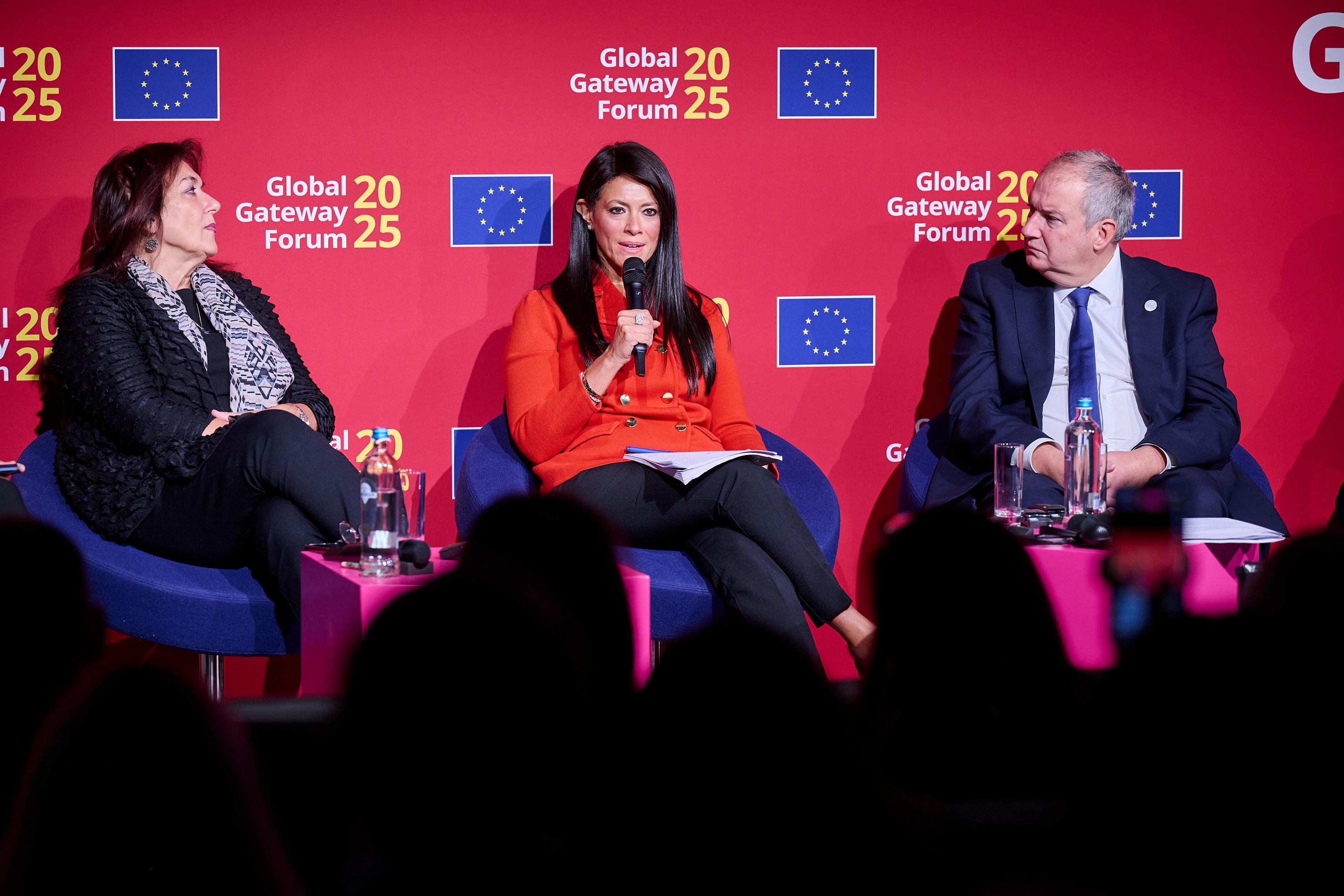H.E. Dr. Rania Al-Mashat, Minister of Planning, Economic Development and International Cooperation, participated in a series of discussion sessions during the Global Gateway Forum held in Brussels, to discuss joint cooperation under the European Union’s “Global Gateway” initiative, strengthen partnerships in the Mediterranean region, promote sustainable and strategic connectivity in the transport sector, and explore investment opportunities in the health sector through strategic partnerships.
During the sessions, H.E. Dr. Rania Al-Mashat emphasized the importance of the Global Gateway initiative, launched by the European Union in 2021, describing it as a strategic initiative that aims to enhance connectivity between the EU and countries around the world through flagship projects in renewable energy, digital transformation, smart transport, education, and innovation.
She highlighted the strategic partnership between Egypt and the European Union, which was reinforced through the Egypt–EU Summit and the Egypt–EU Investment Conference. Through this partnership, Egypt seeks to maximize the benefits of concessional financing for both the public and private sectors, in addition to technical assistance, to promote development in priority sectors. This comes alongside bilateral partnerships with various European countries.
H.E. Dr. Al-Mashat also referred to the role of European multilateral development banks, which play a pivotal role in project design — whether through projects under the EU’s Global Gateway initiative or national projects within partner countries.
She explained that the contribution of these banks goes beyond financing, as they also participate in preparing studies, developing institutional frameworks, and designing project implementation structures. The private sector, she added, plays an equally important complementary role, benefiting from the different financial instruments provided through such partnerships to create jobs and drive economic growth — one of the fundamental national objectives that countries aim to achieve.
The Minister went on to state that the principle of “national ownership” is a cornerstone of any successful international or multilateral cooperation, ensuring that programs and projects stem from the country’s own priorities. She stressed that when a state has clearly defined national goals and well-communicated strategies, it becomes easier to identify common interests with international partners and agree on mutually significant projects.
H.E. Dr. Al-Mashat emphasized the importance of translating partnerships and agreements into concrete, on-the-ground projects that deliver mutual benefits — a principle known as “shared benefit.” She explained that while such projects enable Egypt to advance its development goals, they also provide international partners with greater economic, political, and sustainable development cooperation.
She referred to the European Investment Guarantee Mechanism in Egypt, valued at €1.8 billion, as a vital instrument that builds on Egypt’s ongoing economic reforms to strengthen private sector investment. The mechanism provides investment guarantees to both local and foreign companies through international and European financial institutions operating in Egypt.
In another context, H.E. Dr. Al-Mashat highlighted the launch of “Egypt’s Narrative for Economic Development: Reforms for Growth, Jobs & Resilience,” which serves as a comprehensive framework aligning the Government Action Program and Egypt Vision 2030 in light of recent regional and global developments. The framework aims to shift towards an economic model centered on maintaining macroeconomic stability, focusing on high-productivity and export-oriented sectors, and leveraging Egypt’s advanced infrastructure base to support manufacturing and exports. It also redefines the role of the state in the economy to enhance competitiveness and encourage greater private sector participation, building upon the country’s ongoing economic reform trajectory.
She added that the government continues to implement its economic reform path through the National Structural Reform Program, which includes multiple measures to strengthen macroeconomic stability, improve the business climate, and accelerate the transition to a green economy.
Regarding infrastructure investment, H.E. Dr. Al-Mashat stated that although such investments are costly, they are investments in the future — as they create the foundations for industrial growth, attract private investments, and generate new job opportunities. She noted that Egypt has already begun moving from the phase of infrastructure investment to the phase of expanding manufacturing and exports.
The Minister concluded by affirming that non-tradable sectors represent the foundation from which tradable sectors emerge. Cooperation with international partners through initiatives such as the Global Gateway helps shape clear and targeted policies to increase private sector participation, enhance the resilience of the national economy, and achieve inclusive and sustainable growth.
H.E. Dr. Al-Mashat concluded by highlighting the improvement in Egypt’s economic performance, noting that the country achieved a 5% economic growth rate during the last quarter, driven primarily by the manufacturing and tourism sectors, which Egypt is keen to continue expanding.
